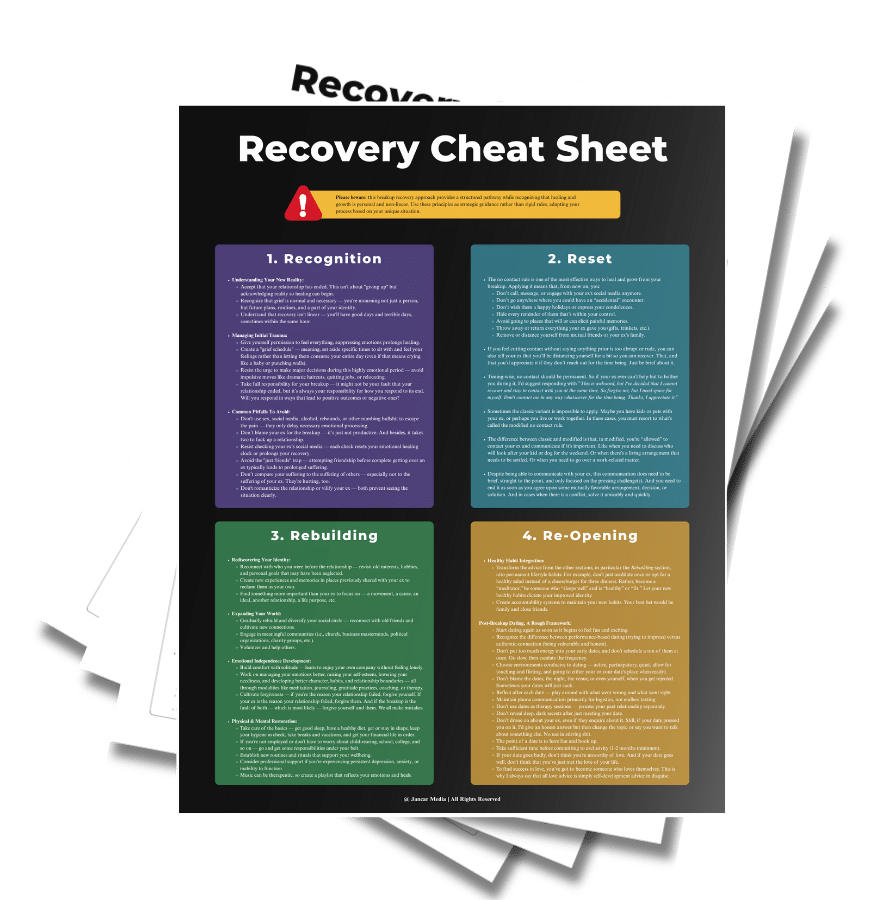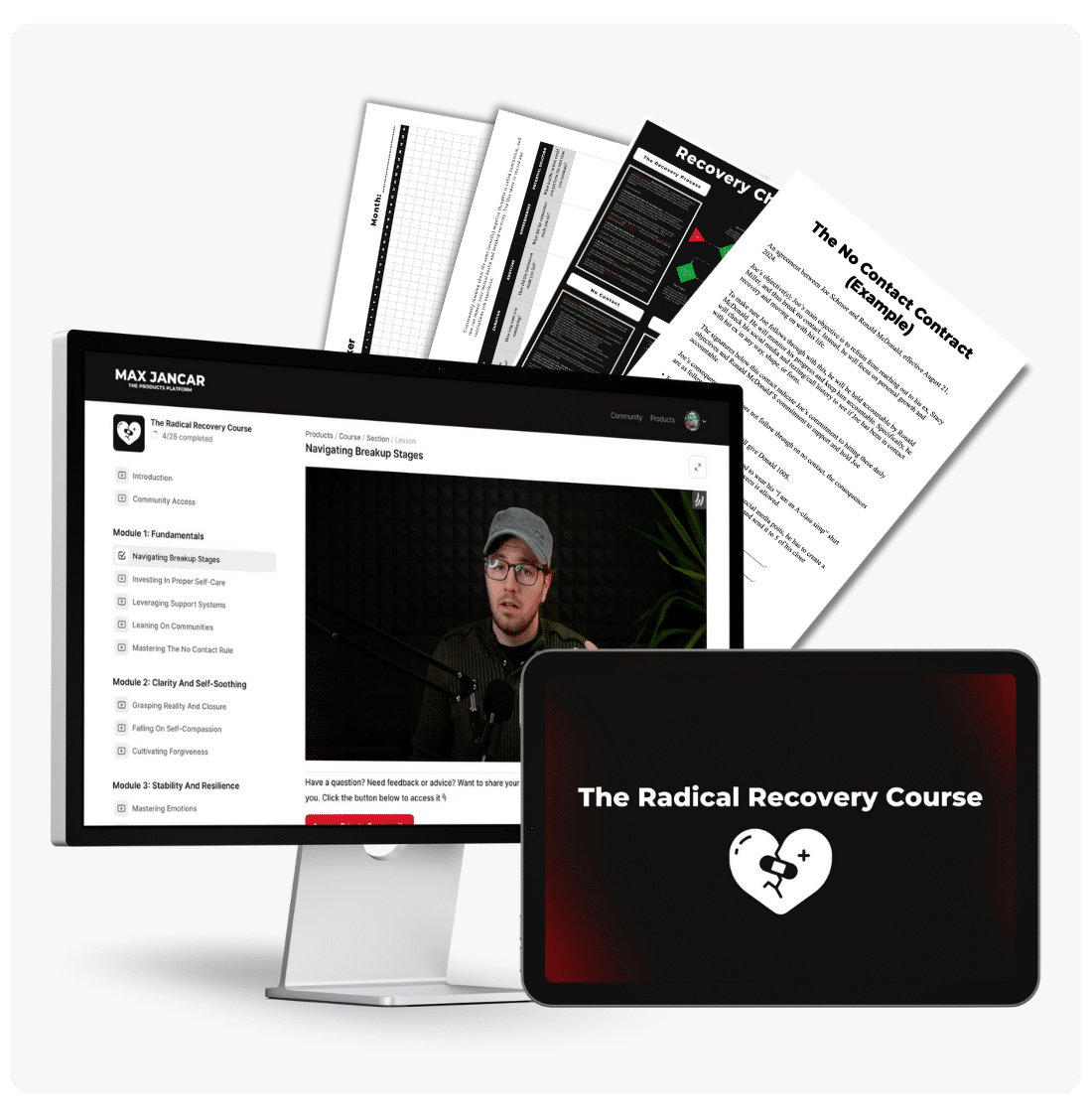Click play to listen to this article.
Here is a collection of common reasons why people break up. Hopefully, by learning about them, you can gain insight into your own relationships and work towards avoiding any potential future breakups.
So, if you’re ready, let’s hear them.
A guide to breakup recovery based on embracing discomfort, extracting wisdom from dark moments, and healing through evidence-based practices.
Order Your Copy1. Infidelity
What makes a person cheat in the first place is that they prioritize self-gratification over intimacy. But the reasons they cheat vary. Usually, it’s either because they feel smothered and restrained in their relationship or because they feel neglected and unwanted.
Bottom line: being committed to a cheater sucks. After all, you always have to sleep with one eye open. You can never fully trust the person while they’re away. And it’s this lack of trust that then causes two people to break up.
2. Abuse
Physical or emotional, abuse is horrible, and we should shame the people prompting it. Abuse in any form is a deal-breaker and should not be tolerated. It erodes the victim’s self-esteem, causes long-term psychological damage, and creates a toxic and dangerous environment.
Bottom line: staying in an abusive relationship is never the answer. Recognizing the signs of abuse early and seeking help can prevent long-term harm and enable the victim to break free and heal.
An online interactive video course that teaches you how to get past a breakup so you can create a new possibility for love (with your ex or someone new).
Get Instant Access3. Lies
When it comes to lying, it’s not the tiny, trivial ones like, “I totally brushed my teeth before I sucked you off…” that cause drama in relationships. It’s the big, nefarious ones that do.
Like when you tell your partner how you’ve been studying with a friend the whole night, while in reality, you’ve been on a rave doing cocaine and sucking off random Chad’s. Yikes!
Bottom line: lies cause havoc in your relationship and have the potential to bury it. They create a foundation of deceit and mistrust, which can destroy the relationship once the truth comes out.
4. Neediness
Neediness comes in many shapes and sizes. It can manifest itself as an excessive need to stay in touch with and control your partner or one where you avoid getting intimate and vulnerable with them. But regardless of how it manifests, the result remains the same: your partner’s interest plummets.
Generally, the needier you are, the less they will want to be around you. The only exception are people who are needy themselves. Hence the saying, “you are what you attract.”
Bottom line: balance and self-confidence are crucial. Being overly dependent or excessively avoiding intimacy can both push people away.
5. Lack Of Healthy Communication
Effective communication is the backbone of any relationship. When partners stop communicating openly and honestly, misunderstandings and resentment can build up. Over time, this lack of communication can create a rift that becomes difficult to bridge.
Bottom line: open and honest communication is vital for resolving conflicts and maintaining a healthy connection. Without it, relationships can slowly deteriorate. When trying to communicate, avoid defensiveness, stonewalling, gaslighting, passive-aggressiveness, and critique. Instead, turn toward each other and well… talk it out like fucking adults.
6. Frequent, Unfruitful Fighting
Contrary to the prevailing notion, not all fighting is bad. Conflicts, disagreements, arguing — these can all be healthy and are a part of any relationship.
It’s only when they become constant and resentment-generating that they lead to a permanent loss of mutual trust and respect between two people, leading to a breakup.
Bottom line: productive conflict resolution is essential for maintaining a healthy relationship. So learn how to fight well. A good starting point is reading the famous relationship guide The Seven Principles For Making A Marriage Work, by John Gottman.
7. Inflexible Boundaries
I initially thought most people get into breakups because they can’t set and keep healthy personal boundaries. Turns out, I was only half right. Many people also get into breakups because they form too rigid boundaries that prevent them from making necessary compromises.
Bottom line: if you want your relationships to work out, one of the many skills you must develop is setting just the right kind of boundaries — not too rigid, but also not too frail. The kind that don’t turn you into a pleaser nor a selfish asshole.
8. Conditional Love
There are two ways one could love another: unconditionally and conditionally. The former means loving your partner regardless of who they are, what they think, and what they do. The latter means loving your partner only when they show up and do what you want.
The former fosters feelings of acceptance and approval. The latter fosters the need to change your partner, stifle their identity, and mold them to your liking.
Bottom line: unconditional love fosters trust, respect, and a deep emotional connection. Conditional love, on the other hand, breeds resentment and conflict, leading to the eventual breakdown of the relationship. Focus on the former, fuck the latter.
9. Unmet Emotional Needs
While everybody has mostly the same needs, we all priorotize them differently. Some people prioritize feeling special and appreciated, for instance. And other people prioritize feeling safe and secure instead.
Now because everyone prioritizes their needs differently, there’s a good chance two partners are meeting each other’s wrong needs while perhaps neglecting the right ones. And thus, chaos ensues. And a breakup occasionally follows.
Bottom line: understanding and meeting each other’s emotional needs is crucial for a healthy relationship. For a solid introduction to this topic, read His needs, Her Needs, by Willard F. Harley.
10. Complacency
Loads of people get into the habit of being exciting and confident the first few months of their relationship, but then that excitement turns into dullness and confidence into neediness.
Then eventually affection stops, attraction evaporates, and both partners begin to take each other for granted. And before you know it, what were once ravishing feelings of love now turn into feelings of merely existing in a relationship — a.k.a., complacency.
Bottom line: make an effort to continually date and court your partner and keep your relationship exciting. And don’t ever start to take your partner for granted. Same is expected of them, of course.
11. No Life
Another reason why people break up is because one partner realizes that the other one doesn’t have a life. Maybe they don’t have friends. Maybe they don’t have any hobbies or meaningful goals. Maybe they sit all days in front on the TV. Perhaps it’s all the above.
Unsurprisingly, these types of people become a total bore to be with. A bore you’d like to break up with.
Bottom line: having a fulfilling life outside your relationship is essential. Personal hobbies, friendships, and a sense of purpose all contribute to being a well-rounded and attractive partner. So take care of these things.
12. Incompatibility
While having chemistry, sexual attraction, and similar hobbies with your partner is important, what’s most important is being aligned in your values, beliefs, and life goals. As soon as there are disconnects there, maintaining your relationship becomes much harder. Not impossible mind you — just more difficult.
Bottom line: compatibility is a bitch. You can’t influence it, change it, or mold it. It’s either there or it’s not. And even if it is there, there’s no guarantee it will stay. And sure, compromises can be made, people can communicate effectively, and therefore, keep the relationship functional — perhaps even thriving. It’s just really, really hard. Don’t underestimate the feat.
[offer]
13. Hit Of Reality
A lot of people today think relationships should be filled with joy, always make sense, that they should last indefinitely, and that love is the only thing you need to make them last.
The reality, however, is far different. Relationships are inherently chaotic and filled with uncomfortable and painful moments. They also seldom last forever. And love is not enough to keep one afloat. There are many other values like trust, respect, empathy, honesty, etc., that one should prioritize over love to have a healthy relationship.
Bottom line: what tends to happen is that a person with a romantic view of relationships eventually gets hit by reality. From there, they either change their beliefs for the better or lose themselves and start sabotaging their relationship by trying to mold it do their delusional expectations.
14. Naivety
Here’s what I mean. Out of naivety, one partner makes a stupid decision, like posting an embarrassing video about the other on social media without their permission or gambling their money away in a casino or through crypto. As a result, one partner loses trust and respect for the other, making a breakup more likely.
Bottom line: reckless decisions — big or small — can lead to relationship problems that lead to break ups. So try to make better decisions. Here’s a good starting point: 10 Tips For Making Better Post-Breakup Decisions.
15. Honeymoon Phase Blowback
Imagine this: you meet someone, you click with them, they’re everything you ever wanted. For the first few months, everything is fun and fellatio. But then, after the initial Honeymoon period fades, you’re met with the brass-tacks of who your partner is.
Turns out who they are is not really suitable for who you are. So before you know it, the tides turn and your relationship starts tumbling downhill. You barely recognize your partner. You start arguing. Resentment builds up. And finally, after weeks of agony and madness, you break up. This is the honeymoon phase blowback.
Bottom line: the honeymoon phase can create an unrealistic perception of a partner. So focus on recognizing and addressing flaws and incompatibilities early on. After all, it can help build a more realistic and sustainable relationship.
16. The Four Horsemen
For years, relationship researcher and author John Gottman studied why people break up. His conclusion? Those who break up do so because of what he calls The Four Horsemen of the Apocalypse: criticism, contempt, defensiveness, and stonewalling.
Bottom line: the presence of Gottman’s Four Horsemen can predict the failure of a relationship. So, do yourself a favor and address these behaviors early in your next relationship. Then, team up with your partner to manage them better.
17. Faulty Love Maps
As children, we never get all of our needs met, which leads to varying degrees of trauma based on our experiences. Some grow up with absent or overbearing parents, exposure to domestic violence, or without a family at all. These unmet needs imprint trauma onto our unconscious, shaping our future sexual and romantic relationships.
Severe trauma often results in skewed beliefs about relationships, such as thinking one must buy affection, keep secrets, or always prioritize their partner’s needs over their own. These faulty beliefs, influenced by our “love map,” can lead to dysfunctional behaviors like objectification and manipulation, which then further leads to a breakup.
Bottom line: unmet childhood needs and resulting traumas shape our relationship behaviors and beliefs. So it’s smart to quickly recognize and address these deep-seated issues, possibly with the help of a therapist, to prevent any future breakups.
18. Insecure Attachment Styles
Attachment theory posits that the way an infant’s needs are met by their parents determines their attachment style, which in turn influences all of their relationships throughout life.
Psychologists identify four attachment styles: secure, anxious, avoidant, and anxious-avoidant. While secure attachment is considered healthy and attractive, the other styles are typically seen as unhealthy and unattractive, at least to mature and emotionally healthy individuals.
Bottom line: secure attachment fosters stability, while combinations of insecure styles, particularly anxious and avoidant, often lead to conflict and breakups. It’s really that simple. But we can — and should! — dig deeper. So read this next: Attachment Theory Explained. Because everyone should have a rudimentary understanding of attachment. It’s just indispensable if you want health relationships that don’t just end in heartbreak.
This cheat sheet lays out 40+ solutions to overcoming a breakup so you can create a new opportunity for love — be that with your ex or someone completely different.
Get The Free Cheat Sheet


